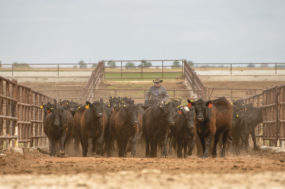Beef farmers say production levels are still falling fast, largely because of the government quotas on beef exports in place since 2006.
“The government decided to cut down on exports in order to push for an increase in the internal offer of beef, in an attempt to reduce the price of the product for local consumers,” said Carlos Pujol, a beef trader in Buenos Aires.
But he explained that the type of cuts the Argentine beef industry exports is not the same type consumed inside Argentina.
“Therefore the stock levels have dropped, as there is no incentive to produce something that won’t get eaten.”
Traditionally, cuts such as filet mignon are destined for exports, while others like skirt tend to be a popular choice within the country.
Official figures show that in 2005 there were more than 57 million cattle heads in Argentina. Last year this number had fallen to 48 million – a drop of more than 15 percent.
Argentines are eating less beef – and to put things in perspective, neighboring Uruguay, a major beef exporter, has about 11 million cattle, almost the equivalent of the amount lost in Argentina in the last half a decade.
In 2005 Argentina sent 483,000 tons abroad, while in 2010 the figure was less than half, as the year closed with 191,000 tons of beef exported, the lowest in a decade.
The Argentine government insists its priority is to guarantee cheap beef for the population, with a strict grip on export allowances.
“It is a typical measure of left-wing governments,” Pujol said. “We are now producing a beef with lesser quality, but cheaper for local consumers.”
Between 2009 and 2010, annual consumption fell from 68 kg per person to 56.7 kg. This meant that for the first time in a century, Argentina lost (to Uruguay) the top spot as the world’s biggest meat-eating nation.
Australia
Plans by McDonald’s Corporation to expand its store network in China could spell good news for Australia’s beef producers.
The fast food chain plans to bring the number of its restaurants in China from 1,356 to 2,000 by 2013 and, according to McDonald’s Australia, Australia’s beef producers are well placed to benefit from the expansion.
Skye Oxenham told Australian Food News, “Australia is already one of the largest beef suppliers to the McDonald’s system worldwide, especially in Asia.
That is because of its competitiveness in the key areas of quality, quantity, dependability and price. So naturally there is potential for Australian beef producers to sell more.”
Oxenham says it is worth noting that while China has 1,356 restaurants today (supplied mainly from Australian and local beef), there are 3,275 McDonald’s restaurants in Japan, currently supplied almost solely with Australian beef. Korea is another market that is growing extremely quickly and that also uses Australian beef.
“McDonald’s Australia has been using Australian beef for more than 30 years and we are committed to continue to support Australian beef farmers,” said Oxenham.
Brazil
Brazil soon might be given the green light to ship fresh beef into the United States after years of being able to ship only cooked beef into the country.
This despite last year’s ivermectin scandal and a recent audit by USDA’s Food Safety and Inspection Service that suggests Brazil has neither demonstrated a sufficient system for conducting recalls nor maintains robust enough testing for E. coli O157:H7.
Currently, Brazil only ships cooked beef products, such as corned beef to the U.S. That might change soon, because of a notice, submitted June 13, by USDA’s Animal and Plant Health Inspection Service that is under review at the Office of Management and Budget.
The notice, “Importation of Beef From a Region in Brazil,” has not yet been published in a regulatory agenda, so no further details are available.
South Korea
South Korea will produce vaccines for foot-and-mouth disease (FMD) next year to protect livestock after the country suffered the worst outbreak of the disease earlier this year, a government agency said last month.
The Animal, Plant and Fisheries Quarantine and Inspection Agency (QIA) said it plans to import FMD antigens from foreign vaccine manufacturers and get local companies to learn production know-how so the drugs can be mass produced throughout the country.
Ukraine
One of Ukraine’s top food industry tycoons has launched a new fast food chain, opening the first of several restaurants in downtown Kiev, reports Black Sea Grain.
The Kryla (Wings) restaurant was established by Yuriy Kosiuk, chief executive officer of London-listed MHP, Ukraine’s largest poultry producer.
Seating about 70 people, it is the first of a chain of Kryla restaurants Kosiuk hopes to launch across Ukraine and possibly abroad. He envisions that another three Kryla restaurants will be launched in downtown Kiev later this year.
“We also plan to develop in the regions,” said Kryla director, Oleksandr Ulanovych. “I see potential in all regional centers for one or two objects in cities with populations exceeding one million people.” ![]()







